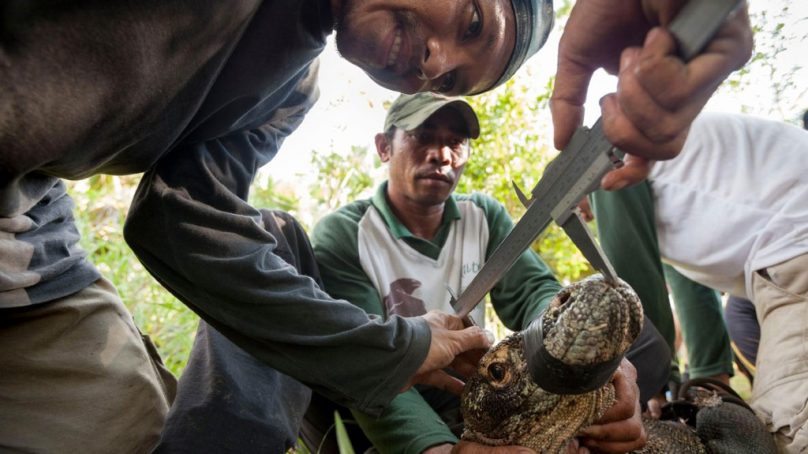
Last year, my colleagues and I organised a webinar on open science with a focus on Indonesia. One participating university experienced blackouts owing to a faulty electricity grid. At another, a generator exploded. At a third, political riots had damaged buildings.
Perhaps most people reading this article would find such constraints intolerable, but the reactions were inspiring. People regrouped and found ways to attend the webinar, or to access it later. We advertised through Twitter and by word-of-mouth and expected only a few attendees — but more than 1,000 academics, government workers, students and journalists participated. The message was loud and clear: Indonesia wants to produce good research.
Research is relatively new in many countries in Asia, Africa and Latin America. Across these regions, young scientists are working to build practices for open science from the ground up. The aim is that scientific communities will incorporate these principles as they grow. But these communities’ needs differ from those that are part of mature research systems. So, rather than shifting and shaping established systems, scientists are endeavouring to design new ones.
Researchers in these regions face many challenges: lack of funding, inadequate access to literature and poor infrastructure. They are disadvantaged by government policies that increase apparent productivity at the expense of quality. T
he development of robust, open research in Indonesia and beyond could have global benefits. By my estimation, more than 80 per cent of the world’s population live in areas where research is developing, suggesting massive untapped scientific potential.
This diverse group of people would provide new ways of thinking about old problems. And global collaborations would increase each researcher’s access to resources and samples that might currently be off limits.
Last year’s webinar was organised with Open Science Indonesia, a grassroots organisation of early and mid-career researchers and the Centre for Open Science, a non-profit organisation in Charlottesville, Virginia.
Over the past several years, I’ve worked in other organisations, such as the South East Asia Network for Open Science, a virtual group lobbying for the need to restructure research bodies and reform education. This has led to conversations and relationships with researchers, university leaders, librarians and government officials.
Financial and career incentives to publish (or disadvantages from not publishing) are common government policies in countries such as Indonesia, China and Brazil where research culture is still being shaped. They aim to increase publication quantity to ‘catch up’ with other countries, but inadvertently encourage poor research practices1.
Scientists in India have resorted to publishing in predatory journals to boost publication count. Similarly, policies encouraging quantity of output have led researchers in China to falsify peer reviews. And these are just a few examples of inappropriate publishing incentives that are considered to have lowered quality in countries where research systems are developing. Consequently, research from these regions is viewed as untrustworthy in some circles.
Lower-income countries cannot waste resources on funding untrustworthy research. Policies should therefore be designed to improve transparency, relevance and scientific rigour, rather than just to increase output — especially if governments want to use research to inform decision-making. Governments must also provide the training, resources and motivation needed for people to take these changes to heart.
Both the policies and their implementation need to reflect each country’s specific needs. For example, asking researchers to submit raw data to public repositories will promote transparency by allowing others to verify and replicate analyses.
An added benefit is that other researchers can make more discoveries using the same information. However, data sharing is poorly received in Indonesia, because, in the past, data have been taken and published without the author’s permission by both local and international researchers.
To overcome this problem, Indonesia’s Institute of Sciences has developed a secure national data repository called the National Scientific Repository (RIN). Each submission is tagged with metadata for ownership. The institute has held workshops to train researchers on how to use the repository, and is convening a team of national and international researchers to assess its policies for data access and reuse.
The team will ask whether the RIN’s policies are suitable for this stage of Indonesia’s research development, and whether they are implemented in such a way that researchers from around the country can practise them.
Crucially, the team will include researchers from many different types of university, not just the largest ones. Going forward, the institute will monitor whether the repository improves research quality.
Other countries will face different issues. But a commonality will be that all stakeholders — not just the rich or prestigious ones — should be involved in finding a solution.
Most universities in Asia, Africa and Latin America were set up for education. Many are ill-equipped to perform research and lack the proper infrastructure. For example, librarians in Nigeria struggle to fill their libraries with the growing body of scholarly literature and modern technology because of constant budget cuts.
Dedicated, reliable funds are essential to support university research. The money could be used to provide support staff, invest in researcher travel and establish procedures for ethics, data collection and grants management. It would enable academics to research and teach more effectively.
Overall, investments should generate a virtuous cycle in which long-term changes in research output yield more government and international funding.
Sustainable changes require education. Universities should train researchers not just in field-specific theories, but also in how to improve scientific practice. This training should cover the pitfalls of modern academia, such as how prestige and academic metrics have contributed to publication bias.
It must address the consequences of succumbing to these pressures for the quality, replicability and trustworthiness of research. And it should honestly highlight disagreements about whether and when these practices actually work — debates about when pre-registration of research is and is not useful, for instance. And researchers must learn about these topics as they begin their research careers, even as undergraduates, rather having to modify existing practices later.
Training in good scientific practices will set scientists up to think more critically and to adopt practices that increase the credibility of their work. For example, the Responsible Conduct of Research programme introduced in Malaysia has greatly improved research integrity in the country.
Training will also enable researchers to add their diverse voices to continuing debates about open science, including active consideration of how science can benefit society, locally and globally.
This shift towards open research might require a reworking of the overall training package, reducing the number of field-specific courses to avoid an overwhelming workload. However, I think that founding a researcher’s training on rigour and transparency will ultimately yield credible — and usable — research. This will benefit a country in the long run. It should also boost scientists’ career trajectories because reputable universities are increasingly asking for evidence of open-science practices when hiring.
To aid training in open science, free online resources are readily available. Over the past few years, there has been an explosion in YouTube videos, written resources and mass open online courses in various languages.
Most academic science is done in Australia, Europe and North America. More than 75 per cent of articles analysed in a survey of the journal Psychological Science drew participant samples from Western countries, despite these countries contributing just 12 per cent to the global population.
Such bias affects our understanding of the natural world and makes it more difficult for researchers from parts of Asia, Africa and Latin America to operate effectively.
This bias might also reflect the fact that leading journals are mostly edited by people from Western countries and prioritise research questions relevant to this region. There are many anecdotal reports of papers involving non-Western samples, or asking questions that seem irrelevant to Western culture, not being readily accepted by journals.
They are dismissed as being insignificant to the wider readership or viewed with suspicion because of where the research originated. One study that presented US researchers with identical abstracts found that the researchers were more likely to recommend the paper to a peer if its authors were listed as being from the United Kingdom than if they were from Malawi.
Journals should take an active role in reducing under-representation, without compromising rigour. One simple step would be to ask authors to explicitly describe the populations they study upfront, and not to generalise their findings beyond this sample without good reason.
Double-blind reviews tackle the positive bias experienced by prestigious institutions or authors. Open reviews could reduce potential bias against samples from outside Western countries. Established journals should make efforts to communicate their standards to scientists in developing research cultures, and could also host special issues focused on understanding under-represented populations.
Societies and conferences based in developed research cultures must also involve scientists from growing research cultures. A lack of funding and travel restrictions in many parts of Asia, Africa and Latin America reduce these opportunities for international collaboration, networking and travel, leading to researchers becoming more isolated. Such problems need to be acknowledged explicitly and confronted.
Examples of good practice already exist. The Psychological Science Accelerator is a global network of psychology laboratories established to run massive multi-site studies, which routinely includes researchers in developing systems for studies and policy development. The Society for Neuroscience has several outreach programmes, including a scholars’ programme for Latin America. The US-based Centre for Open Science frequently engages with grassroots organisations in Asia, Africa and Latin America to build open science in these regions.
Individuals can make an impact, too. Researchers from Australia, Europe and North America should connect with scientists in Asia, Africa and Latin America. Many of my peers note how valuable such interactions are. Knowing that a member of the international community is supporting them motivates them to improve their research.
It is crucial that any efforts to make space for researchers from parts of Asia, Africa and Latin America are based on mutual respect and focus on empowerment rather than taking control. Those in positions of power should simply provide others with the opportunities that they themselves have been afforded.
In the past, researchers from Western countries have sometimes collected and published data without giving due acknowledgment to their collaborators in other parts of the world. One solution suggested recently is that funding bodies could design policies to ensure collaborations between the global north and less-advantaged research countries are true partnerships.
In the past decade, there has been a sharp increase in research institutions from Asia, Africa and Latin America judging faculty members by whether they succeed according to Western standards — that is, publishing in prestigious journals.
If these criteria remain, the pressure to publish at all costs is likely to be the biggest challenge to creating credible scientific output.
Metrics and policies should be in place only if they are useful to science’s goal: knowledge accumulation for the greater societal good. Constant monitoring and introspection are therefore essential. Some of the best initiatives to improve science today might not be relevant in the future.
For example, China has stopped its cash-for-publication system after realising its impact on the quality of publications. We cannot expect there to be sustainable change in behaviour if people are incentivized to do the opposite.
If young research cultures can guard against harmful practices becoming ingrained, they have the opportunity to lay down a new type of strategy for open research. This could avoid the pressures that can sometimes warp research in the Western world and ultimately produce work that is credible and beneficial to society. The goal is not to replicate what is done in North America, Europe and Australia — rather, it is to do better.
- A Nature magazine opinion / Sandersan Onie











